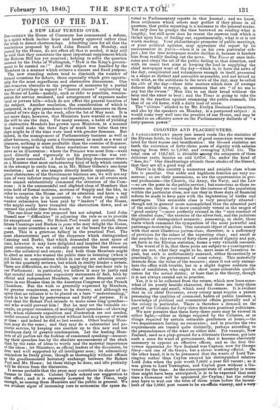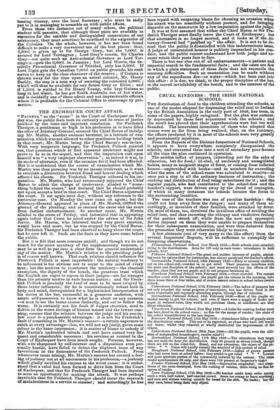COLONIES AND PLACEHUNTERS.
A PARLIAMENTARY paper just issued reads like the statistics of the Elysian fields, to which heroes of good connexion were trans- lated for their repose and beatification : the blessed statistics set forth the existence of forty-three posts of dignity with salaries ranging from 800/. to 7,000/. and averaging 2,784/. 15s. The total sum of 119,7401. is divisible samong the occupants of these delicious seats, besides an odd 2,070/. 16s. under the head of "fees, &c." One disadvantage attends these abodes of the blessed, that they are all a good way off. There is in this country a numerous and amiable class whose fate is peculiar. Our noble and highborn families are very nu- merous; so are their possessions, so are the opportunities in gen- teel.professions—the Church, the Army, the Navy, and the Law —so are the posts in the public service; but numerous as those re- sources are, they are not enough for the-increase of the population within the particular class, nor can they in these days,of financial reform be made to keep pace with the registration of births and marriages. This estimable class is very peculiarly situated : though not in general more accomplished than the educated part of the middle class, it is more completely versed in the usages of "good society "—more perfectly trained in the "nice conduct of the clouded cane," the exercise of the silver fork, and the judicious frigidities of distinguished manners ; possessing, in short, those traits which command the sympathies of the most powerful and patronage-bestowing class. One constant object of anxious search' with that most illustrious patron-class, therefore, is a sufficiency of provision for the solace of the expecting class - and small as the number is this reserve of forty-three posts of dignity and pay, set forth in the Elysian statistics, forms a very valuable resource.
The worst of it is, that these posts are subject to a contingency : they are not, what they ought to be, mere seats of luxurious re- pose, but each is unfortunately annexed, -either theoretically or practically, to the government of some colony. This materially detracts from the value ofthe resource ; since it not only encum- bers the office with trouble, but in a slight degree restricts the class of candidates, who ought to show some colourable qualifi- cation for the actual duties; at least that is the theory, though it is not always carried out in practice. Yes, it is to be collected from the return, which now loses some- what of its purely beatific character, that there are forty-three colonies, great and small, which need Governors. It is evident that in its chief Governor, every colony must require a person possessing the qualities of command, habits of public business, a knowledge of political and commercial affairs generally and of the colony in particular. There is therefore a demand on the part of the Colonies for forty-three first-rate practised politicians.
We now perceive that these forty-three posts may be viewed in either light,—either as things required by the Colonies, or as things required by certain estimable gentlemen at home,—the two requirements having no connexion ; and in practice the two requirements are treated quite distinctly, perhaps according to the preponderance of the want on either side. For example, New Zealand, used as a play-ground for a dilettante Governor, (rot into such a mess for want of government, that it become absolutely necessary to appoint on effective officer, and so the first Go- vernor appointed for New Zealand was Captain now Sir Georg Grey—not one of the Greys, but a clever working official. the other hand, it is to be presumed that the wants of Lord Tor- rington rather than Ceylon swayed his distinguished relative Lord John when the post worth 7,000/. a year fell vacant ; so it was given to Lord Torrington, and Ceylon goes without a Go- vernor for the time. As the consequent state of anarchy is worse than might have been anticipated, it -is to be expected that next time a Governor will be appointed for Ceylon • but the colony may have to wait out the term of threzueare before the incum- bent of the 7,000/. post -ceases to be e mieeroy, and avePy
teazing viceroy, over the local Secretary ; who must be sadly put to it in managing to scramble on with public affairs.
From these two instances out of many others, the political student will perceive, that although these posts are available as resources for the amiable and distinguished connexions of our aristocracy, they must sometimes be sacrificed to the exigencies of the Colonies. On the whole, however, it has not been found difficult to make a very convenient use of the best places : thus, 2,600/. is given up to Sir George Grey, but the 7,000/. is secured for Lord Torrington ; Lord Grey's cousin, Sir Charles Grey—not quite such an Anti-colonial Governor as Lord Tor- rington—gets the 6,000/. in Jamaica ; but Lord Harris, the de- cidedly Pro-colonial Governor of Trinidad, only has 3,500/. If Lord Elgin gets the Canadian 7,000/. on public grounds, his rank serves to keep up the class character of the reserve ; if Guiana is thrown away for the time upon an actual colonist, Mr. Henry Barkly, the step is a neat way of securing the contested 5,000/. ; which will thus be available for any future Grey or Elliot ; and if 1,500/. is yielded to Sir Henry Young, who kept Guiana so long in hot water, he has got South Australia out of hot water, and is decidedly one of those adroit and not impracticable officials whom it is profitable for the Colonial Office to encourage by pro- motion.



























 Previous page
Previous page